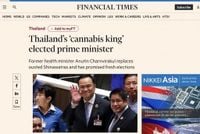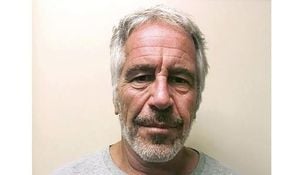In recent years, the global debate over cannabis legalization has taken center stage, with countries and states rethinking decades-old policies. Nowhere is this shift more visible than in Thailand and the United States—two nations grappling with the promises and pitfalls of cannabis reform. As both countries weigh the social, economic, and political consequences of their shifting stances, the world is watching to see if the green tide will continue or recede.
Thailand’s journey into cannabis reform has been nothing short of dramatic. In 2022, the Southeast Asian nation made headlines by becoming the first in Asia to decriminalize cannabis. This groundbreaking move was spearheaded by then-Health Minister Anutin Charnvirakul, leader of the Bhumjaithai Party, who had made legal cannabis a central plank of his party’s 2019 election platform. The promise was simple yet powerful: cannabis would become a new cash crop for Thailand’s struggling farmers, especially in the impoverished northeast, and the country would lead the region in progressive drug policy.
The impact was almost immediate. According to the Bangkok Post, thousands of dispensaries sprang up across the country, catering not only to locals but also to a wave of tourists from neighboring countries where cannabis laws remain harsh. The economic boom was palpable, and Thailand’s cannabis industry seemed poised for long-term success.
But the euphoria was short-lived. Within months, a public backlash erupted, fueled by reports in Thai media of rising addiction rates and drug-related problems, particularly among young people. Critics argued that the market was dangerously underregulated, allowing easy access to cannabis products that were supposed to be restricted. The debate quickly became a political football, with the newly elected Pheu Thai Party vowing to roll back legalization. Yet, as AP News reported, their efforts were hampered by coalition politics—Bhumjaithai remained a powerful partner, and resistance to reversing course was strong.
By June 2025, the government could no longer ignore the mounting pressure. New regulations were enacted, banning dispensaries from selling cannabis without a medical prescription and reclassifying cannabis buds as a controlled herb. Sellers who violate these rules now face up to a year in jail and a fine of 20,000 baht (about $614). As of September, only patients with prescriptions for specific conditions—insomnia, chronic pain, migraines, Parkinson’s disease, and loss of appetite—can legally purchase limited amounts for personal use. The Department of Thai Traditional and Alternative Medicine is tasked with enforcing these rules, marking a sharp pivot from the earlier, more permissive environment.
Amid this regulatory whiplash, Anutin Charnvirakul’s political fortunes have soared. On September 5, 2025, he was elected Thailand’s 32nd prime minister, winning the support of 311 MPs in the House of Representatives. This development did not go unnoticed abroad. The Financial Times dubbed him "Thailand’s cannabis king," a moniker that ignited controversy back home. Theerarat Samrejvanich, an acting deputy interior minister from the Pheu Thai Party, voiced her alarm on social media: “If this is how the international community perceives us [Thailand], it raises serious concerns about the potential impact on national economy, investment and tourism, especially in terms of global confidence.” Her post quickly gained traction online, reflecting a segment of Thai society uneasy with the country’s new global image.
Bhumjaithai Party members, however, pushed back. Nan Bunthida Somchai, the party’s spokesperson, criticized the focus on the headline, insisting that their cannabis policy “has always been focused on medical use only.” She argued that critics were misrepresenting the party’s intentions and that the full Financial Times article did not paint Anutin or the party negatively. Another party member, Kharom Phonphonklang, emphasized that the original goal was to “regulate traditional herbal use and prevent criminalization.” Still, the rapid and sometimes chaotic rollout of legalization left gaps that critics say enabled a surge in recreational use, something the outgoing Pheu Thai government has worked to curb.
Meanwhile, across the Pacific, the United States faces its own cannabis conundrum. Despite nearly 90 percent of Americans expressing support for at least medical legalization, marijuana remains a federally scheduled drug—classified as Schedule I, on par with heroin and LSD. This contradiction between federal and state law has created a patchwork of regulations, with 24 states and Washington, DC, fully legalizing cannabis and another 12 permitting it for medical use only. The legal cannabis industry was valued at $32 billion in 2024, according to Bloomberg, but federal restrictions continue to create banking and tax headaches for businesses. Section 280E of the tax code, for instance, bars cannabis companies from claiming standard business deductions, branding them as illegal traffickers in the eyes of the IRS.
President Donald Trump has recently signaled that change may be on the horizon. As reported by Al Jazeera, Trump is considering reclassifying cannabis from Schedule I to Schedule III—a move that would soften penalties but stop short of full legalization. “It’s a very complicated subject base,” Trump said at an August news briefing. “I’ve heard great things having to do with medical and bad things having to do with just about everything else.” At the same time, the Marijuana Opportunity Reinvestment and Expungement (MORE) Act was reintroduced in Congress, aiming to completely lift the federal ban and expunge criminal records for cannabis-related offenses.
Yet, the American story is not one of unqualified progress. As Cat Packer, a cannabis policy expert, told Al Jazeera, “Black and brown folks have been four-to-five times more likely to be arrested simply for cannabis possession. And it’s been cannabis and other drug laws that have really fueled mass incarceration and are a significant factor of why the United States has more people in prison than any other country in the world.” Legalization has not always redressed these injustices; many of those previously criminalized face barriers to entering the legal market, while large corporations and even former law enforcement officers now dominate the industry.
The black market, too, remains stubbornly resilient. In California, illicit cultivation and distribution continue to outpace legal operations, with organized crime groups exploiting the regulatory gray zones. Kevin Sabet, director of Smart Approaches to Marijuana (SAM), warned, “Rescheduling is a giveaway to Big Marijuana, its Big Tobacco and Big Alcohol investors, and [China]-backed Mexican cartels.” He also cited mounting health concerns, including a recent study in Heart linking cannabis use to increased risks of heart failure and stroke. “This is no longer the ‘Woodstock weed’; this is a chemically and genetically modified creation of corporate conglomerates,” Sabet argued, underscoring the need for robust regulation if not outright prohibition.
Back in Thailand, the debate continues to roil both parliament and the public square. Anutin’s supporters maintain that the country’s cannabis experiment was meant to be tightly controlled and medically focused, while critics worry that the genie is out of the bottle. Whether Thailand’s next chapter will see a return to prohibition or a more mature regulatory framework remains to be seen. In the United States, the path forward is equally uncertain, as politicians, business interests, and activists vie to shape the future of cannabis policy in a country still deeply divided on the issue.
As both nations navigate these turbulent waters, their experiences offer a cautionary tale and a beacon of possibility for others considering similar reforms. The world is, quite literally, watching—and waiting to see what comes next.





